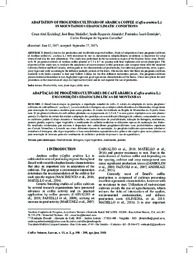Adaptation of progenies/cultivars of arabica coffee (Coffea arabica L.) al. in mountainous edafoclimatic conditions.
Adaptation of progenies/cultivars of arabica coffee (Coffea arabica L.) al. in mountainous edafoclimatic conditions.
Author(s): KROLING, C. A.; MATIELLO, J. B.; ALMEIDA, S. R. de; EUTRÓPIO, F. J.; CARVALHO, C. H. S. de
Summary: Brazil is known for production and worldwide export of coffees. Study of adaptation of new progenies/cultivars of Arabica coffee (C. arabica L.) with resistance to rust in mountainous edaphoclimatic conditions is important for crop renewal and also for new plantations. This study was performed in the mountainous region of the Espírito Santo state, Brazil, with 30 progenies/cultivars of Arabica coffee planted at 2.5 x 0.7 m spacing with four replicates and seven plants/plot. The objective of the study was to evaluate the adaptation of rust-resistance coffee genotypes and compare them with the standard cultivars (Yellow and Red Catuaís), with regards to the characteristics of productivity, rust infection, productivity, sieve, aspect, plant vigor and yield according to the different maturity periods of the fruits. The results show that there are progenies/cultivars available with yields superior to Red and Yellow Catuais for the five different maturation periods. The progenies/cultivars present tolerance/resistance to rust, high plant vigor and good agronomic characteristics of the beans. These are options for new plantations or for renovation of crops for high harvest yield and do not required the use of pesticides.
Publication year: 2018
Types of publication: Journal article
Unit: Embrapa Coffee
Keywords: Ferrugem, Peneira, Plant vigor, Productivity, Produtividade, Rendimento, Rust, Sieves, Vigor vegetativo, Yields
Observation
Some of Embrapa's publications are published as ePub files. To read them, use or download one of the following free software options to your computer or mobile device. Android: Google Play Books; IOS: iBooks; Windows and Linux: Calibre.
Access other publications
Access the Agricultural Research Database (BDPA) to consult Embrapa's full library collection and records.
Visit Embrapa Bookstore to purchase books and other publications sold by Embrapa.

